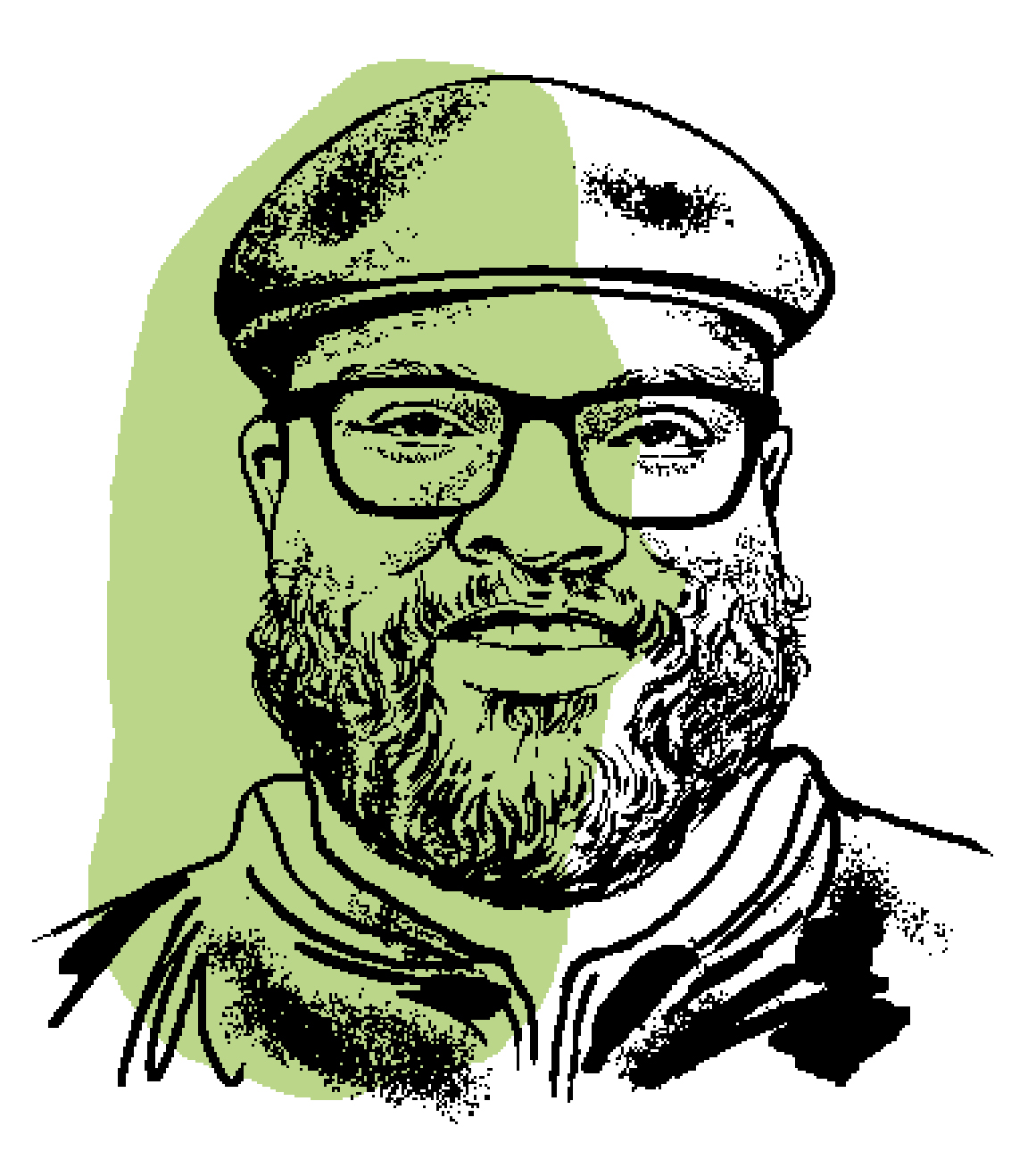After the 2016 election, there was a sense of panic in many newsrooms—journalists had missed a huge part of the Trump story because, ensconced on the coasts, they hadn’t been adequately covering working-class Americans’ hardships, worries, and resentments. Over the past two years, the media has worked hard to restore the working class to its rightful place in the nation’s political narrative, but these Americans still have many complaints about media coverage. During a weeklong trip I took to one of the nation’s main industrial belts—stretching from Cleveland through Lordstown and Youngstown to Pittsburgh—I saw that truck drivers, steelworkers, and autoworkers are astute consumers, and students, of the press.
A steelworker remarked that “the American worker has been put on the back burner” by the media. Several workers said they wanted more local coverage of plant closings, the negative effects of trade, and the waves of layoffs that have hit their communities. Some said they wanted more stories on the difficulties their children face affording college and on the financial challenges of retirement—that is, if they can afford to retire. They praised the media, print and broadcast, when those outlets covered matters of great local concern, such as the opiate crisis or campaign finance scandals in their state capitals.
Some workers love Sean Hannity and Fox News; some prefer Rachel Maddow and MSNBC. Many dislike, even resent, all the shouting on cable television. And many say they no longer trust the press—and not just because Donald Trump has declared war on mainstream news organizations. Rather, many workers wax nostalgic about Walter Cronkite and ask, “Where are the respected, unbiased voices of yesteryear?” Blue-collar workers vigorously, even angrily disagree about whether the media is fair to Trump. Some workers say the coverage of him is far too harsh and one-sided; others argue that tough, probing coverage of Trump is urgently needed.
ICYMI: A NYT article about Twitter got lot of pushback from journalists
The media covers blue-collar America less closely than it did several decades ago. Christopher R. Martin, author of No Longer Newsworthy: How the Mainstream Media Abandoned the Working Class, which will be published in May, tells me that as more outlets became publicly owned and traded on the stock exchange, they began pursuing a different audience to help boost profits. “Many moved from a mass audience to more of an upscale audience,” Martin says. “Many newspapers have cut back on, or entirely eliminated, the labor beat—the one beat that talked about the life of the working class.”
At many news organizations, editors are assigning more “upscale minded” stories about skiing vacations in Aspen and whether to invest in Apple and fewer pieces about factory closings in Akron and layoffs in Cincinnati. A result of this approach: the one-hour walkout by 20,000 Google workers received tremendous coverage in the national media, while a steelmaker’s lockout of 2,200 blue-collar workers, for seven painful months, garnered hardly any attention at all.
With unemployment unusually low and wages rising, blue-collar Americans are doing far better than they were during the Great Recession, but many still seem anxious. As in 2016, how working-class Americans feel about Trump and the economy could be the deciding factor in the 2020 election. Will the press hear them? Five people gave me a chance to listen.
Kevin Koubeck
Truck Driver and Trump Fan, Newbury, Ohio

Illustration by Agata Nowicka
At 7:02 on a Monday evening, Kevin Koubeck received a text: get to the terminal in Kent, Ohio, just outside Akron, by 10pm to drive a truckload of freight to Carlisle, in central Pennsylvania. It would be 500 miles round-trip, and Koubeck—a burly 56-year-old with a salt-and-pepper goatee—would make the journey and arrive back in Kent by 9am Tuesday.
On the road, Koubeck begins with country and western or rock on Spotify, then switches to sports talk radio for a few hours, and some nights to a satellite radio show that gives practical tips to truckers—how to maintain their logbooks or file their taxes. At 5 most mornings, Koubeck turns to NPR’s Morning Edition. “They don’t try to tilt my opinion,” he says. He has little patience for Rush Limbaugh: “I don’t listen to him. He gets on these rants.”
When he’s back home, Koubeck—who has driven a big rig for 30 years—mainly watches Fox 8’s local news, based in Cleveland. “I just think they’re fair and evenhanded,” he says. “It’s not slanted like Fox News or CNN.” Another big plus in his eyes: “I like that all the reporters are from this area.” Koubeck grew up in Cleveland Heights—his father was a truck driver, his mother a junior high school history teacher. He now lives in a roomy, 70-year-old house, where I met him. It’s nestled in country meadows in Newbury, some 30 miles from Cleveland. It’s homey, with a fireplace, an eight-foot-tall, century-old church organ that his wife inherited, and an antique Flexible Flyer sled in the entryway.
Koubeck has some nostalgia for how the news used to be, when there was less partisanship and nastiness. When he was young, his parents subscribed to the Cleveland Plain Dealer and the Cleveland Press, but now he doesn’t subscribe to a newspaper. Still, he pays attention to stories close to home, like the 2018 Ohio governor’s race. His brother, a deputy sheriff in Lorain County, is concerned about Ohio’s opiate crisis—there were 4,854 drug deaths in the state in 2017—and Koubeck praises the media for covering that problem.
Keeping a close eye on who fights for workers, Koubeck usually votes Democratic, but not in 2016: “Bernie would have been my guy. He had some great ideas. He would have done a lot for college education.” (Koubeck’s son is in college, and his daughter recently finished.) After Sanders lost the primary, Koubeck was drawn to Trump partly because he was convinced that Hillary Clinton wouldn’t battle for workers or be tough on trade. “As a blue-collar Teamster who voted for Trump, I voted for change. We had Obama and the Democrats. . .but they did nothing for us.” He liked Trump’s combative talk on trade and his “Make America Great Again” slogan.
Now that Trump is in office, Koubeck criticizes the way the press covers him. “They really nitpick everything Trump does,” he says. “I don’t know why the media is so worried about Stormy Daniels. They’re more worried about what Trump did before he was president than what Bill Clinton was doing as president. It’s ridiculous.”
His wife, Sandy, chimes in: “They overemphasize things that don’t matter, about things that aren’t going to affect me. All the stories about Trump and Stormy, I don’t care to hear.”
Stephanie Allein
The Laid-Off GM Worker, Lordstown, Ohio

Illustration by Agata Nowicka
Talk to Stephanie Allein for a minute, and it becomes abundantly clear why she doesn’t have the time or energy to worry about national or world news. The day after Thanksgiving, she learned she was losing her job—General Motors announced that it would “idle” its colossal assembly plant in Lordstown, laying off Allein along with 1,600 other workers there. Allein, 40 and thin, with long, chestnut hair and an almond-shaped face, is deeply worried about what comes next.
“It’s devastating,” she says. Allein transferred to Lordstown in 2010 after GM shuttered the assembly plant where she worked in Shreveport, Louisiana. Four years earlier, she moved her family to Shreveport from Lockport, her hometown in upstate New York, because a GM-owned auto parts plant there had laid her off.
“I’d like to be able to plant my roots somewhere. I feel like a gypsy,” says Allein, whose job in Lordstown was assembling dashboards for Chevy Cruzes. Moving from Lockport to Louisiana to Lordstown wasn’t easy for her two daughters, now 19 and 21. Now she has to move again—this time to GM’s plant in Spring Hill, Tennessee—but she’s at least thankful that her daughters won’t be forced to change schools.
Allein takes a “news you can use” attitude toward the media. “We’re all watching the local news right now because we’re all hoping to hear something good,” she said. Speaking in mid-December, she voiced hope that President Trump and Ohio’s governor and US senators would somehow persuade GM to keep the Lordstown plant open—perhaps it could assemble electric vehicles. But that hasn’t yet happened, and GM is ending US production of the Chevy Cruze because of slumping sales.
“Things get so misconstrued from what we hear in the plant,” Allein says. She got upset when she heard media reports that GM workers earn $80 an hour. “We really don’t make $80, not close,” she says. “It’s more like $30, and we lost our cost-of-living adjustment. Things get switched around and stretched around in the news.
“I watch a lot of local TV to see what’s going on,” she adds, mentioning the extensive coverage of a December 9 house fire that killed five children in Youngstown. “I love channel 33”—WYTV, an ABC affiliate in Youngstown—“and I like the Vindy news”—the Youngstown Vindicator. “It seems to be pretty good. I flip through the channels—Fox, all of them.
“I’ve never been huge into politics,” she continues. “But I think since GM has been impacted greatly by politics, it’s hard not to get involved in following politics.”
Allein was working in Shreveport in 2009, when GM filed for bankruptcy reorganization. The Obama administration rescued it with a $49.5 billion bailout, although Allein didn’t love the media coverage at the time. “It was a little bit harsh,” she says. “They felt the government bailout cost too much. They made the workers look overpaid and underworked. I definitely felt bad. They focused more on what we”— the workers—“did wrong, not what we did right. We worked really hard. We’ve worked hard to help GM regain its reputation.” (After the federal government sold its 61 percent stake in GM, the rescue’s total cost to taxpayers was $11.2 billion.)
Allein likes much of the local coverage about the Lordstown plant, including the stories about how the layoffs will hurt local stores and restaurants. “I’m seeing pieces on how it is affecting more than just us, how it will affect the whole community,” she says. “I like that they cover that there are hopes to keep the plant open.”
Many local TV station executives would feel blessed to have enthusiasts like Allein. “Mornings I usually stick to my 33,” she says. “They help keep me on time. I always listen while I’m getting ready to leave for work. I’m keeping track of what’s going on. They help me keep touch with the big stories.”
JoJo Burgess
The Steelworker Who Loved Rush Limbaugh, Canonsburg, Pennsylvania

Illustration by Agata Nowicka
In the 1990s, long before he started working at an electrical equipment factory south of Pittsburgh, JoJo Burgess was in the Army, first at Fort Hood in Texas and then in Iraq during Desert Storm. Back then, Burgess—now 48 and with the frame of a football player and a bushy beard—was a Rush Limbaugh fan. A lot of what Limbaugh said “made sense,” Burgess says. He lapped up the attacks on Bill Clinton and Democrats for spending too little on the military.
“I believe my survival in the military depended on being registered Republican,” says Burgess, who voted for George H.W. Bush in 1992. “I heard Rush Limbaugh talk about his core conservative values, and we, as Republicans, this is how we felt.”
After returning from Iraq, Burgess soured on Limbaugh. “When Limbaugh started talking about inner-city Blacks and welfare recipients, I got uncomfortable,” recalls Burgess, who is Black. “I realized I was aligning myself against my own people. Everything he said was driving me crazy.” Burgess’s parents divorced when he was 4, and afterward “my mother worked the heavy highway, blacktop, she did road construction”—a pioneering job for a woman. In the winter, when road paving was suspended, she was often jobless for months. Some winters, she turned to food stamps to feed her family.
Growing up, he read the Pittsburgh Post-Gazette and the Tribune-Review. In particular, he liked the political columns and Mike Royko, an acerbic Chicago-based columnist. Burgess still enjoys stories about workers, labor unions, and developments in the local economy. But he doesn’t subscribe to a newspaper. “After I started to work, I got lazy, and the cost of newspapers became so much,” he says. In 1999, he began working at Pennsylvania Transformer in Canonsburg, five miles from where he grew up; he is a control apparatus assembler, helping make $1.5 million electrical transformers for power plants, which can be as large as a room.
In 2003, when the Iraq War began, “I started watching CNN seriously,” Burgess says. “My twin brother said that was the channel to watch the war.” He also watched a lot of Fox News; he liked when Sean Hannity, a conservative, and Alan Colmes, a liberal, locked horns. “CNN and Fox, I thought they told the same stories, but in different ways,” Burgess says. “Come 2008, when Obama got elected, Fox took a radical change. It was venomous. It was terrible. Hannity fell off his rocker.”
Nowadays, Burgess watches local TV news, partly because the national media often ignores blue-collar workers. “The working class in this country is not a newsworthy story to the media—unless it’s something that jumps out at you,” he says. “US Steel was on the brink of shutting down every plant”—when its workers threatened to strike last September—“but how much of that did you see on CNN or Fox? It was on the local news. National media didn’t cover it.” Same with the 2,200 workers locked out of Allegheny Technologies for seven months.
Burgess reads newspapers online, especially when friends or the United Steelworkers, his union, recommend stories via Facebook. Burgess often argues on Facebook with a police officer friend—they played high school football together 30 years ago in Washington, Pennsylvania, an industrial town south of Pittsburgh. “My friend says Obama is a Muslim. He says Obama was sworn in twice on the Koran.” Burgess has little patience for his friend’s more conspiratorial beliefs, saying he eats up whatever the right-wing news media tells him.
“Most of my friend’s stories come from Breitbart,” Burgess says. “He’s a Fox News guy. A lot of his stuff comes from Sean Hannity. It’s like brainwashing—that’s what it is.”
John Boyer
‘I’m a Christian and a Gun Owner,’ Pittsburgh, Pennsylvania
John Boyer, 50, describes himself as a Christian first, a gun owner second, and a union man third. He grew up in a deeply conservative home, and “over the years I became a shadow of my parents,” he says.
Boyer typically works 60 hours a week, from 7:30am to 7:30pm Monday through Friday, making large deliveries for UPS, mostly to businesses outside of Pittsburgh. If you order a trampoline, Boyer delivers that; if you order a few trampoline springs, regular UPS drivers deliver them. “I like my job,” he says. “I like the freedom. I’m not in a plant where someone is looking over my shoulder.”
Boyer is soft-spoken and thoughtful; his favorite pastime is fly-fishing. He likes watching something calming and enjoyable (not the news) when he gets home. While driving his UPS truck, for news he usually listens to local radio. He never listens to talk radio, finding it far too opinionated.
Boyer, who owns a few sporting guns, is convinced that the media has an anti-gun agenda. “When I have knowledge of something and hear a story about it,” he says, “I know when they’re full of beans.” It angers him that after a mass shooting, television or radio reports will often state that the killer used an “automatic weapon”—machine guns are prohibited by law and largely unavailable—when a semiautomatic was used. “There should be stricter standards of accuracy,” he says. “I face stricter standards as a truck driver.”
Similarly, Boyer complains that the media, when it does stories on the victims of rape or incest, skews coverage of abortion in favor of keeping it legal. He doesn’t think the media attacks Christianity, but he does see condescension toward religion. “It’s more of an indirect thing, describing people as ‘Bible-thumping, gun-toting hillbillies.’ ”
Boyer, who has fond memories of watching Tom Brokaw and Peter Jennings, is upset by what he calls “the extremeness of the attacks, of the hate” he sees in today’s media. “You talk to somebody on the left, and they say Fox is all about hate. You talk to somebody on the right, they’ll say CNN is all about hate. I think the media potentially is leading us to civil war. It feeds on hate. They do it for ratings. It’s not about putting out facts. It’s about who can scream the loudest.”
These opinions aren’t limited to the media under Trump. Boyer also thought the press was unfair to George W. Bush: “You had a guy with a Harvard degree and a Yale degree, and the media painted him as the dumbest son of a bitch on the planet.” In his view, the mainstream media marked out a liberal path and “that created the need for a Fox News.” “If they had stayed in the center,” Boyer says, “I don’t think there’d be a need for Fox.”
Fred Crow Jr.
Concrete Truck Driver and Media Maven, Cleveland, Ohio
Soon after finishing high school, Fred Crow Jr. followed in his uncle’s footsteps and took a job driving concrete trucks. For the next 31 years, Crow, who is 57, delivered truckloads of concrete to construction sites in and around Cleveland, for office towers, apartment buildings, and shopping malls. Meanwhile, he became so well-informed—and passionate—about politics that, three years ago, his Teamsters’ local made him its political director, giving him even more time to pay attention to the media.
Crow is stocky, with a neatly trimmed beard and a serious mien; his face sometimes becomes pained as he discusses the problems America’s workers face. “I think we’ve kind of been left behind by the media,” he says. “It’s not covering how we got the shaft. All I hear from the media is how these trade deals are a good thing.”
In his view, journalists often seem part of a coastal elite. “They don’t see things through our eyeglasses very well, how working families see things,” Crow says. “I don’t think they’re doing their homework.” Journalists, he feels, have paid too little attention to how trade deals have hurt the Midwest, the safety problems workers face, and the way right-to-work laws weaken unions.
On a shelf in Crow’s office stands a bright-red model of the concrete truck he drove. There’s also a big protest sign reading “Stop the War on Workers” and a photo of him standing next to James P. Hoffa, the current president of the International Brotherhood of Teamsters.
As an outspoken advocate for labor, Crow has fighting words for Fox News. “The policies they back are in large part hurting my family and other working families,” he says. Fox, Crow believes, backs politicians and policies that would hold down wages, hobble unions, and worsen health coverage for millions of Americans. “They’re basically the American version of TASS,” Crow says. He can cite chapter and verse on how Fox skews the news to help Republicans and Trump. “Before [the 2018 midterm] elections, Fox pushed a lot of fairy tales about the caravan and what immigrants are doing to this country.
“I like Morning Joe,” Crow continues. “Joe [Scarborough] is conservative, and he freely admits it. I think he gives you a balanced outlook on things, although everyone on the right says he’s fake.” As someone who fights for pro-worker legislation in Ohio’s state capitol, he reads newspapers from across the state, including the Toledo Blade and Cincinnati Enquirer. “I love the Plain Dealer,” he says. He also lavishes praise on The Columbus Dispatch for its investigation into corruption at Ohio’s largest online charter school.
Like many union activists, Crow opposed the North American Free Trade Agreement and keeps close tabs on trade. Those concerns attracted him to Ed Schultz, a pro-labor television/radio host who died last July, and to Lou Dobbs. “I used to watch Lou Dobbs. He talked about fair trade.” But Crow has soured on Dobbs, who he feels has moved far to the right on subjects other than trade. “He’s now a lunatic,” Crow says.
Trump, he says, is a liar. “If the press just reports on what Trump does,” Crow tells me, “people on his side say you’re doing it unfairly, but that’s because what he does is so negative.”
When asked about Trump’s attacks on the media as an “enemy of the people,” Crow responds angrily: “I hate that. It’s so much like Germany in the 1930s. I see many ugly parallels, and I’m of German descent.
“A free press is vital,” he says. “I think you guys do a wonderful job.”
ICYMI: A twitter account all journalists should be following
Steven Greenhouse was a New York Times reporter for 31 years, covering labor and workplaces from 1995 to 2014. He is the author of Beaten Down, Worked Up: The Past, Present, and Future of American Labor, to be published this August by Knopf.


